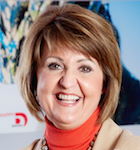Brinker International, one of the world’s largest casual dining companies, operates and franchises more than 1,500 Chili’s Grill & Bar locations in more than thirty countries, and owns Maggiano’s Little Italy. Brinker’s human resources team, known as PeopleWorks, oversees health care and benefits for 55,000 team members, and focuses on developing employee talent and promoting the company culture. Tony Bridwell joined Brinker International in 2013, as senior vice president of PeopleWorks, and was named chief people officer in March 2014.
When you started working with Brinker, the country was in a recession and employee turnover was high. Last year, Brinker was named one of the best places to work in the Dallas-Fort Worth area by the Dallas Business Journal. How did you make that change?
Tony Bridwell: Before joining Brinker, I worked for an international leadership training and management consulting company. In late 2008, Brinker president Wyman Roberts and Chili’s chief operating officer Kelli Valade invited me to lunch, and we talked about what wasn’t working. The economy had changed, the country was heading into a recession, and the restaurant industry was facing big challenges. Brinker had gotten away from the principles that made it a great organization, and we talked about what it would take to get back to that point. We spent that lunch sketching out a strategy on how to proceed: using some key cultural models and creating awareness around what needed to happen to get the results we wanted.
How did the company’s transformation play out across Brinker’s global operations?
Bridwell: From that lunch table we planned an agenda for the annual managers meeting in Dallas to lay the groundwork for what a shift in the culture would look like. We put a team together to lead the change. That group first paved the way with the leadership team and then rolled it out to the entire leadership community—1,500 people. We introduced a simple model we called the Results Pyramid: in this model, the base is experiences, which develop beliefs, which drive actions, and at the top are results. For thirty-five years, Brinker had been operating only at the top of the pyramid, on actions and results.
How long did this rollout take?
Bridwell: Culture has been a priority for five years and continues to be a key priority. We started to see definite improvement after eighteen months—we were moving the needle. We are at the point now where we can do things within our organization in one quarter that would have taken us a year previously. You can see the evidence in our stock prices. In 2008, we were trading around $4 per share; by 2009, $13 per share, and now it’s around $45 per share.
What is your definition of a vibrant company culture?
Bridwell: For us, it’s creating a culture of
accountability. People make a personal choice to demonstrate the ownership necessary to achieve desired results. We see our people doing four things that show us we are doing it right: constantly giving focused feedback, ongoing sharing of stories, accountability, and continually giving recognition. You hear it in the language people use in the hallways and see it in the experiences they share.
What internal and external challenges, like the recession, did you face in creating this transformation?
Bridwell: Internally, some individuals were not comfortable with the changes we were making, and they left, which required an adjustment period. It wasn’t a lot of people, but it had an impact. Today, looking at some of the key areas we track—employee turnover rate, employee engagement, and guest engagement—we are where we want to be. The recession hit the restaurant industry hard, and casual dining took it on the chin. That continues to be a challenge for us. The number of visits to restaurants over the last five years has been declining, but the number of new restaurants being built is increasing.
What are your plans for the PeopleWorks group and maintaining company culture?
Bridwell: PeopleWorks handles benefits, compensation, development, growth, and anything related to people on a daily basis. Our challenges are like everyone else’s: we need to protect and grow our talent. We have a saying here, “Either we manage the culture or the culture will manage us.” All we do is geared towards managing our culture. In the past twelve to eighteen months, we have been developing the concept of supporting a more complete team member, looking at employee well-being in all the basic areas: career, physical, financial, social, and community.
How did your career path lead you to this job?
Bridwell: In 2009, I was brought in as an outside consultant with Partners in Leadership, Inc., a leadership training and management company, to help redefine Brinker’s culture and business practices to cope with the changing economy. I worked with Brinker’s senior team, and then the new CEO asked me to lead PeopleWorks. I have a background in architecture, theology, and business, which has now led me to become chief people officer for a huge organization. I’m not sure it’s where anyone thought I would end up, but it’s actually been a great background for HR.
What advice do you have for human resources executives trying to create a vibrant company culture? Bottom line, what makes it happen?
Bridwell: Don’t try to do it on your own. I started working with Brinker as a consultant. Sometimes you really need to partner with an external professional so they can point out what you can’t see. Next, get simple as quickly as possible. As executive teams, we notoriously make simple things entirely too complex.
What other advice do you have for these executives?
Bridwell: Find something right off the bat that you enjoy doing and let it take you to places that you’re passionate about. Pay attention along the way to the key things you’re learning, because they will play out in the future. Listen to your direct reports and team members and find out what is important to them. You’re always learning something vital that you can use later.

